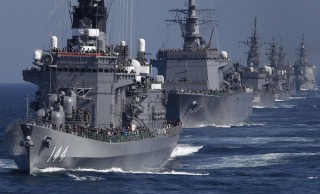Loading
Search
▼ Japan For First Time Mentions Taiwan Stability In Defense Paper
- Category:Other
Japan for the first time referred to the importance of stability around Taiwan in its annual defense report, ratcheting up its concerns over the island that has been a flashpoint in tensions between China and the U.S.
The wording in the “Defense of Japan” white paper released Tuesday increased friction between the two biggest economies in Asia.
A spokesman for China’s Foreign Ministry told Tokyo not to interfere in Taiwan issues and said Beijing expressed “firm opposition” to the wording in the report.
“The stability of the situation around Taiwan is important, not only for the security of our country, but for the stability of the international community,” Japan’s Defense Ministry said in its white paper.
“Our country must pay close attention to this, with an even greater sense of vigilance.”
The Japanese government has taken its concerns over Taiwan public in recent months, and the white paper comes after Deputy Prime Minister Taro Aso drew Chinese anger by saying in July that Japan and the U.S. would have to defend Taiwan in the event of a serious contingency.
“The Japanese side grossly interfered in China’s internal affairs, groundlessly blamed China’s normal defense construction and military activity, pointed fingers at China’s maritime activity, and hyped up the so-called China threat, which is wrong and irresponsible,” Chinese Foreign Ministry spokesman Zhao Lijian said at a regular briefing Tuesday.
Taiwan’s Foreign Ministry welcomed the wording in Japan’s white paper, saying in a statement Taipei would “continue to urge like-minded nations to pay attention to the importance of security and peace in the Taiwan Strait to regional prosperity and stability.”
While Japan has generally sought to avoid offending China, its biggest trading partner, U.S. President Joe Biden and Prime Minister Yoshihide Suga referred to the need for stability in the Taiwan Strait in a statement following their April summit in Washington.
Defense Minister Nobuo Kishi also said in an interview last month the security of Taiwan was “directly connected” to that of Japan.
Taiwan is a key producer of the semiconductors needed to advance Japan’s economy, and the Luzon Strait to the south is an important shipping lane for the energy tankers resource-poor Japan relies on to power its factories and homes.
China sees Taiwan as part of its territory and hasn’t ruled out the use of force over the matter. Earlier this month, President Xi Jinping called his country’s quest to gain control of Taiwan a “historic mission” in a speech marking the 100th anniversary of the Chinese Communist Party.
“As the Biden administration makes clear it will support Taiwan in a military sense, it is unlikely China will compromise with the U.S. stance, and there is a possibility that a confrontation between the U.S. and China will emerge,” the Japanese ministry said in the report. While reiterating it stands by the “One China” policy, Suga’s government has stepped up its support for Taiwan. Japan has donated more than two million doses of Covid-19 vaccine to its neighbor, even as Taipei blamed Beijing for its difficulty in sourcing its own supplies.
Tensions have grown around Taiwan in recent months, with China sending 28 military planes close to the island in June, the largest exercise this year, while the U.S. has continued to send warships through the Taiwan Strait. Japan is only 110 kilometers (70 miles) from Taiwan at its closest point.
Separately, Japan’s white paper also included a column on the sharp increase in South Korea’s defense spending. On current trends, South Korea’s defense budget will be 1.5 times that of Japan by 2025, the ministry said.
The policy comes against the background of President Moon Jae-in’s desire to take back wartime operational control of the military from the U.S., according to the report.
While South Korea has spent heavily for decades to defend its side of the heavily militarized border with North Korea, Moon has embarked on one of the country’s biggest weapons build-ups in years, seeking to add an aircraft carrier and nuclear-powered submarine to project its power at a greater distance from its shores.
The publication of the column came as ties between the two U.S. allies remain chilly over disputes relating to Japan’s 1910-1945 colonization of the Korean Peninsula.
- July 13, 2021
- Comment (0)
- Trackback(0)


